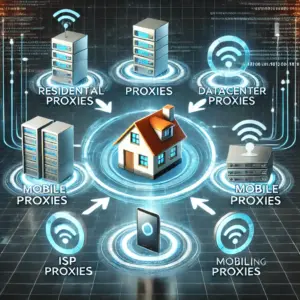Proxy technology development has been in line with the growth of demands for anonymity, security, and data collection ability in a more globalized world.

Even though proxies have traditionally been used for privacy, access to content, and network protection, the proliferation of automated processes, online marketing campaigns, and cyber threats has extended their function.
Among the many types of proxies, residential proxies stand out as much for their legitimacy, efficiency, and effectiveness in simulating natural user activity on the internet.
However, there needs to be a comparison of the different proxy types, including datacenter proxies, ISP proxies, mobile proxies, and rotating proxies, which have various advantages and trade-offs depending on the purpose of application.
Understanding Residential Proxies within the Larger Proxy Context
A residential proxy redirects web traffic from an IP address assigned by an ISP to a physical device such as a home computer or smartphone.
This fundamental difference makes residential proxies stand out from the others since they borrow the credibility of real users, making them less likely to be flagged or blocked by websites using stringent access policies.
Because the IP addresses of these proxies look just like genuine residential users, they are in demand for web scraping, market research, advert verification, and geo-restricted content.
Contrasted with datacenter proxies, which are generated by hosting companies and lack a user location, residential proxies offer more legitimacy. Web pages increasingly utilize advanced detection tools that identify non-residential IPs, usually banning datacenter proxies since they are so predictable and exist in subnet cluster ranges.
This is particularly relevant when discussing the effectiveness of residential proxies versus other alternatives.
Comparing Residential Proxies with Datacenter Proxies
Datacenter proxies operate through servers that are located within data centers, not real residential networks. Although they are highly scalable and offer high-speed connectivity, being artificial makes them more susceptible to detection.
Websites that rely on IP reputation databases will typically categorize datacenter proxies due to sequential or static IP allocations.
On a performance basis, datacenter proxies can handle large traffic at a cheaper cost than residential proxies.
Companies employing extensive web scraping, penetration testing, or auto surfing typically utilize datacenter proxies due to their affordability and availability. If the intent is to bypass strict access control or geo-blocks, however, residential proxies are better because they cannot initiate the same automated detection methods.
All the same, residential proxies come with a significant drawback: cost. Acquiring residential IPs from peer-to-peer networks, permission-based applications, or ISP partnerships takes infrastructure more complex than deploying datacenter proxies.
Residential proxies are consequently more expensive and suited to use cases demanding greater success rates compared to brute quantity.
ISP Proxies: A Hybrid Between Residential and Datacenter Proxies
ISP proxies, or static residential proxies, are positioned somewhere in between datacenter and residential proxies by combining the reliability of datacenter infrastructure with the legitimacy of residential IPs.
In contrast to standard datacenter proxies, ISP proxies run on IP addresses supplied by ISPs, rather than hosting providers, offering residential-like legitimacy with guaranteed high-speed connectivity.
This hybrid approach renders ISP proxies particularly suitable for applications that require longer sessions, such as several social media account handling, sneaker copping, and automating e-commerce. In comparison to residential proxies that rotate or dynamically switch, ISP proxies have static IPs that lower the potential of session intermitting.
Their greatest asset lies in the fact that they are able to establish stable connections without putting themselves at risk of being detected similar to datacenter proxies.
However, ISP proxies share some of the same shortcomings as residential proxies, particularly with regards to price and availability. Since ISPs are responsible for issuing these IPs, it is more complicated to secure a stable collection of ISP proxies compared to deploying standard datacenter proxies.
In addition, even though ISP proxies are less visible than datacenter proxies, they are not fully invisible since high-end detection solutions can still discover them based on patterns of usage.
Rotating Proxies and Their Overlap with Residential and Mobile Proxies
Rotating proxies, rather than being a distinct category, are a method of cycling between different IPs in a proxy network.
The rotation can be utilized for residential, mobile, or datacenter proxies, depending on the provider’s infrastructure. The most significant advantage of rotating proxies is that they can distribute requests across several IPs, reducing detection and ban likelihood.
Rotating residential proxies are a great method of web scraping and data harvesting on a massive scale and evading the triggering of anti-scraping methods. Rotating proxies alter their IP addresses at set times or after a given number of requests to make the traffic appear not to be automated.
Even as rotating proxy effectiveness is dependent on the quality of the underlying IP pool, badly managed residential or mobile proxy infrastructures can introduce latency or increased failure rates due to inconsistent IP availability.
Further, websites employing sophisticated anti-bot methods may still detect behavioral outliers even when requests originate from different IPs.
The Practical Implications of Proxy Selection
The choice between residential, datacenter, ISP, mobile, and rotating proxies depends on the specific requirements of the intended application.
Residential proxies are the most authentic and thus can be utilized in activities related to stealthy access like managing social media accounts and accessing content from particular areas.
Datacenter proxies, being inexpensive and high-speed, are best suited for large-scale automation where detection risks are acceptable. ISP proxies provide an appropriately balanced means of maintaining persistence for sessions, and mobile proxies suit best in conditions where concealment is paramount.
Rotating proxies, utilized in residential or mobile networks, impose another anonymity level and avoid rate limiting.
Understanding the pros and cons of each type of proxy is critical to organizations and individuals who seek to optimize their processes without sacrificing compliance with ethical and legal standards.
As internet security technology continues to evolve and anti-proxy technologies are enhanced, strategic proxy deployment will continue to be a determining element in securing effective and reliable online transactions.




Leave a Reply